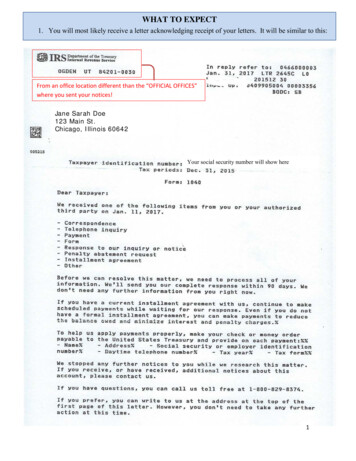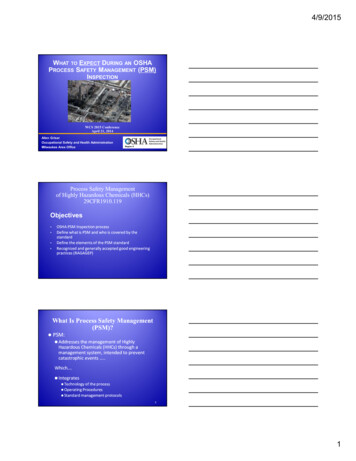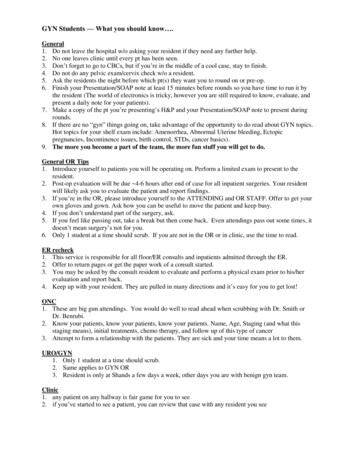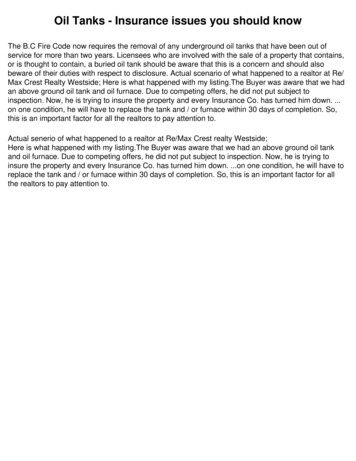
Transcription
www.hbrreprints.orgAnd what you should expectin return.What Your LeaderExpects of Youby Larry BossidyIncluded with this full-text Harvard Business Review article:13 Article SummaryThe Idea in Brief—the core ideaThe Idea in Practice—putting the idea to work14 What Your Leader Expects of You20 Further ReadingA list of related materials, with annotations to guide furtherexploration of the article’s ideas and applicationsReprint R0704C
What Your Leader Expects of YouThe Idea in BriefThe Idea in PracticeRelationships between bosses and theirsubordinates figure strongly in any team’ssuccess. When those bonds are working asthey should, they drive performance andgrowth over the long haul. Yet while theleadership literature specifies actionsbosses should take, it says little about theactions leaders should expect from theirfollowers.The boss-subordinate compact spells outadditional expectations for both parties:COPYRIGHT 2007 HARVARD BUSINESS SCHOOL PUBLISHING CORPORATION. ALL RIGHTS RESERVED.How to promote effective leader-followerrelationships in your team? Former AlliedSignal CEO Bossidy advises forging aboss-subordinate compact that defines amutual set of crystal-clear expectations.For example, as a direct report, you’re expected to offer your creative ideas. Yourboss wants to hear them, because evenseemingly crazy ideas can spark spectacularsuccesses. As the boss, you’re expected totell your people where the business isgoing, why, and how they’ll benefit if theyaccomplish key goals. This clarity helpspeople see how their jobs contribute to theenterprise overall.When each side fulfills its part of theboss-subordinate compact, your teamand company benefit.inspire your own people no matter what’sgoing on around you.AS A SUBORDINATE AS A LEADER Get involved. If you’re a manager, step inthe moment someone falls behind with hiscommitments, when an interpersonalconflict crops up, and when a crisis erupts.And deliver bad news to your boss yourself. Define specific goals for your people.Specify the achievements you expect fromyour employees as a team and as individuals, as well as what they are going to bemeasured on over a given period. You’llhelp them decide where to invest theirenergy and time. Collaborate. Overcome differences between you and others so you work togethereffectively—even if you don’t like each other. Lead initiatives. Don’t be reluctant to associate yourself with unproven ideas, especially those that cross functional or unitboundaries. Raise your hand, and you’ll climbthe ladder faster than those who don’t. Develop your own people. Take as activean interest in your employees’ developmentas you do in your own—if not more. Go outof your way to criticize and praise your peoplewhen they need it. And get directly involvedin performance reviews, supplying peoplewith specific, candid, and useful feedback. Be available. If you expect your people tostay up to date and keep you informedabout what’s going on, be accessible whenthey need to see you. And don’t comedown on them if they bring you bad news. Compensate employees fairly. Ensure thatpeople understand how the compensationsystem works, and that they’re rewarded forspecific contributions to goals you’ve laid out. Stay current. Regularly read and watch thenews. What happens in the world affectswhat happens with your team, your marketplace, and your competition. Also knowwhat’s going on with your customers—how they’re changing, how their competition is changing, and how technology andworld events are affecting their strategies.Your customer relationships are key assets:bring them to the table. Drive your own growth. Seek perpetualeducation and development—not necessarily by going to school but by finding exposure to new people and ideas. Seek feedback from your boss, and acceptdemanding assignments. Be a player for all seasons. Demonstratepositive behaviors even during hard times.You’ll sustain your ability to motivate andpage 13
And what you should expect in return.What Your LeaderExpects of Youby Larry BossidyCOPYRIGHT 2007 HARVARD BUSINESS SCHOOL PUBLISHING CORPORATION. ALL RIGHTS RESERVED.It’s well understood that the relationshipsbetween a boss and his or her direct reportsare important ones and figure strongly inthe success of a team. Yet while much hasbeen written about character traits and issuesof openness and trust, the leadership literature has had strikingly little to say aboutwhat a leader should be able to expect fromhis people. Over the years, I’ve observed thatcertain behaviors, on the part of both thesubordinate and the boss, are conducive toproductive and rewarding relationships. Indeed, I’ll favor someone who exhibits the behaviors I expect over someone who doesn’t,even if the latter’s numbers are slightlybetter, because I know the former has thepotential to contribute more to the organization over time.In sharing the lists below—what I’ve cometo think of as the CEO compact, a set of expectations both from and for a leader—Ihope that I can help other leaders and teamsimprove their relationships and, as a consequence, their performance.harvard business review april 2007What I Expect from My DirectReportsThe following behaviors are powerful individually, but taken together they drive performanceand growth in a way that has a significant effecton long-term results.Get involved. Good executives know how todelegate. But more important, they knowwhen a situation calls for their immediate involvement, whether it’s in redirecting resources to a product that’s suddenly taking offin the market, helping to resolve a breakdownin quality, or visiting a plant to discover whyits productivity has faltered. There’s no excusefor not taking responsibility when you see aproblem growing. I count on my reports totake the blame for things that go wrong andgive credit for positive developments to theiremployees. And I expect them to have thecourage to deliver bad news. If you’ve got toclose a plant, go to the plant and tell those employees yourself.While there are no hard-and-fast rules aboutwhen your involvement will have the most impage 14
What Your Leader Expects of YouLarry Bossidy was the chairman andCEO of AlliedSignal from 1991through 1999 and the chairman andCEO of Honeywell from 2001 to 2002.He has also served as the COO of General Electric Credit Corporation (nowGE Capital) and as the vice chairmanof General Electric.harvard business review april 2007pact on the business (that’s a judgment call),I’ve found that good managers generally stepin under three types of circumstances: whensomebody is falling behind in her commitments; when important personnel mattersarise, particularly if there is conflict; and in acrisis. Just because you’re an executive vicepresident doesn’t mean you don’t have towork anymore.Generate ideas. A common frustration incorporate America is a lack of ideas. A personwho is innovative and creative is a pearl to betreasured. Unfortunately, idea people are notgenerally applauded in organizations. They’refrequently at the periphery, because peoplethink they’re off the wall. But I want to hearwhat they have to say; it’s my job to siftthrough ideas and decide which ones havemerit. Often the best ideas sound crazy at first.For instance, when I got to AlliedSignal, people were very dispirited by the company’s lagging performance, and I was looking for a wayto raise morale. Somebody suggested that wehire a band, put out hamburgers and hot dogsat midday, and make lots of noise, so the employees would feel there was a reason for optimism. A lot of people said it was corny andwouldn’t work—but it did, and it became anannual event. Another example: When sales ofa particular liquid we offered declined, onemanager proposed we paint the canistersbright colors instead of the industrial gray wehad been using. The idea was met with derision, but we tried it, and it made a difference.Sales recovered.As for more mainstream executives, they cancome up with good ideas too, but often theyare reluctant to speak out. I’m willing to givethem a little push. If I’m in a meeting and people aren’t volunteering anything on a controversial subject, I tell them we’re going to bethere for a while. The subsequent silence getsuncomfortable—eventually enough so thatpeople start to talk. In one case, I came to ameeting to discuss a management problemwe’d noticed in a customer organization. Ilisted three or four reasons why it was important for me to speak with the customer’s CEOabout it. People resisted, but they weren’t offering any alternatives. We waited for quite awhile, and finally somebody spoke up. Aftersome dialogue we decided that a person lowerin our organization would speak to a personlower in the customer organization, ratherthan risk the flap that would come out ofelevating the issue to the highest level.Be willing to collaborate. It’s surprising howmany people still resist collaboration or sharing credit, even though we know how muchmore we can achieve when we bring everyoneto the table at once. There can be very practical reasons for this—for example, it may notbe in someone’s financial interest to cooperate. But I expect people to trust that I will notice when they take an action that, say, coststheir unit 2 million in the short run but willbenefit the company overall in the long run.This is something I take very seriously. Someyears ago I was running a big business that wasfunctionally structured. The person who ranmanufacturing and the one who ran marketing and sales did not get along well; they justwouldn’t communicate. And because theydidn’t work together well, neither did their organizations. As a consequence, our inventorieswere always out of balance. The three of usmet, and I told them that it didn’t matterwhether they liked each other or not, but theway they worked together had to change. Theyleft the meeting with instructions to overcometheir differences, but three months later, nothing had changed. I called them back into myoffice and gave them both separation packageson the spot, telling them that although Ithought they were good performers individually, their failure to collaborate was hurting theenterprise. An imposing guard was waiting atthe door to take their badges and escort themfrom the plant.At about 3:00 that afternoon the telephonerang. It was the two of them, asking to gain entrance to the plant. The first thing they saidupon arrival was “We get it.” They came backto work, and I don’t know that they everlearned to like each other, but they learned towork well together—and more important, sodid their organizations. Our overall performance improved considerably.Be willing to lead initiatives. There’s no wayof knowing how a challenging new project willturn out, so people are often reluctant to beassociated with an untested idea, particularlyif it crosses functional or unit boundaries.They duck under the radar screen rather thanrisk going up in flames. But I want people toraise their hands. When we started with SixSigma at AlliedSignal, some people didn’t likeit or weren’t sure about it, but I’ll never forgetpage 15
What Your Leader Expects of YouI expect people to read, towatch the news—not justbecause it makes themmore interesting butbecause what happens inthe world affects whathappens to us, to ourmarketplace, and to ourcompetition.harvard business review april 2007the people who took a chance, who assumedleadership roles even though they didn’t knowmuch about the program. That’s an attribute Iprize in my employees. The ones who led theSix Sigma efforts were told that their careerswould be accelerated if they succeeded, andthose who made a contribution beyond unitboundaries did in fact climb the ladder fasterthan those who didn’t.Develop leaders as you develop. Too manypeople are selfish about their development. Iwant my direct reports to take as much interest in their subordinates’ development as theydo in their own—if not more. Early in my career, when I was at GE, I had a boss, a midlevelmanager, who was a good performer but knewthat he had gone as far as he was going to go.He called me in one day and said he felt I hada chance to be a lot better than he was andthat he was going to do everything he could tohelp me reach my potential. From that moment on, he was more interested in my development than in his own. He went out of hisway to criticize or praise me when I needed it.I’ll never forget him; he played a very meaningful role in my career.A strong signal that executives are committed to developing their direct reports isinvolvement in performance appraisals. I expect my people to be personally involved inreviews—not to hand them off to someonein Human Resources—and to supply theiremployees with specific and useful feedback.When I was at GE and Allied, I regularlyreviewed the goals my direct reports weresetting for their subordinates. If they werevague, I asked them to keep working untilthey’d achieved an appropriate level of specificity. For instance, someone might list“improve interpersonal skills” when what hereally meant was “be more willing to collaborate.” The goals have to be specific enoughthat people know how to approach the issueand whether or not they’ve made progress.“Improve interpersonal skills” doesn’t tell anemployee what to do.Stay current. There’s nothing more depressing than sitting in a business meeting withpeople who don’t know what’s going on in theworld. I expect people to read, to watch thenews—not just because it makes them moreinteresting but because what happens in theworld affects what happens to us, to our marketplace, and to our competition. We makedecisions in the context of world events, sopeople need to pay attention to them.I also expect people to know what’s going onwith customers—how they’re changing, howtheir competition is changing, how technologyand world events are affecting their strategies.Customer relationships are an asset; peopleshould bring them to the table.Anticip
And deliver bad news to your boss yourself. Collaborate. Overcome differences be-tween you and others so you work together effectively—even if you don’t like each other. Lead initiatives. Don’t be reluctant to asso-ciate yourself with unproven ideas, espe-cially those that cross functional or unit boundaries. Raise your hand, and you’ll climb the ladder faster than those who .











